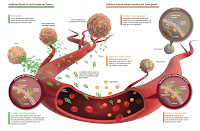Gastrointestinal stromal cancer is a disease in which abnormal cells divide without control. This led them to invade other tissues and spread to other parts of the body through the lymph and blood systems. There are over 100 different types of cancer and it is not one disease but many diseases. When the mass of the cells divide uncontrollably, they form a mass of cells called a tumor. Not all tumors are cancerous and are divided into benign and malignant tumors.
During the final stages of gastrointestinal stromal cancer, cancerous tumors in the lungs allows the cancer spreads to other body parts as well. Options for the drug are minimal, almost nil! However, there are treatments that can help fight the condition of patients with a relatively easy manner. So, what happened in the last stage of the cancer stroma? Take a look around.
 |
| Add caption |
- Liquid stored in the patient.
- Shortness of breath is likely to occur due to fluid build up!
- With the spread of lung cancer, especially into the airways, the patient may experience delays or even bleeding!
- It is common for lung cancer spreads to the chest and spinal cord. Constant pain in the bones is a look at the last stage of lung cancer.
- Continue to lose weight is also one of the common symptoms in the last stages of lung cancer.
- If lung cancer has spread to the brain, then symptoms such as headaches, speech problems, weakness, and seizures are common.
Gastric cancer, more commonly known as stomach cancer due to abnormal growth of cells in the lining of the stomach. People who eat foods rich in spices and salt, pickled or smoked foods, tobacco and alcohol consumption and family history of gastritis are more susceptible to stomach cancer. People who are above 60 years are common victims of this cancer and observed more in men.
Gastric or stomach cancer prognosis depends mainly on the stage of cancer, age and general health condition of the patient. The survival rate, when the condition is diagnosed at an early stage, depending on the location and spread of cancer in the stomach. Research has shown that the survival rate of patients up to 50 percent, if the cancer is diagnosed early. But unfortunately, only 10 to 15 percent of cases are diagnosed at an early stage. Five-year survival rates of gastric cancer was about 20 percent.

